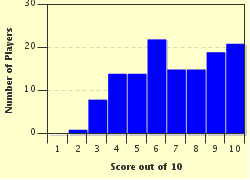Quiz Answer Key and Fun Facts
1. "De revolutionibus orbium coelestium" - Heliocentrism - Quantity Theory of Money
2. Father of Observational Astronomy - Telescope - Inquisition
3. "Astronomiæ Instauratæ Progymnasmata" - Johannes Kepler - Nose
4. "Novum Organum" - Father of Empiricism - Lord Chancellor of England
5. "Philosophiæ Naturalis Principia Mathematica" - Reflecting Telescope - Calculus
6. Cosmic Pluralism - Mnemonic Techniques - Heresy Trial
7. "De humani corporis fabrica" - Father of Modern Human Anatomy - Imperial Physician
8. Barometer - Projectiles - Trumpet
9. "The Sceptical Chymist" - Alchemist - Pressure and Volume
10. Logarithms - Bones - Laird of Merchiston
Source: Author
ponycargirl
This quiz was reviewed by FunTrivia editor
bloomsby before going online.
Any errors found in FunTrivia content are routinely corrected through our feedback system.

